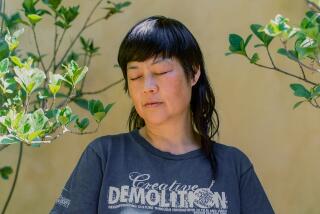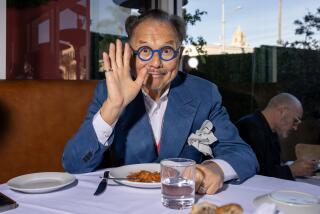Who Knew the Places He’d Go
- Share via
Memories of Michael Chang go back a way, long before his remarkable French Open title in 1989 and even well before he became the youngest male player to win a main-draw match at the U.S. Open in 1987.
Whether or not it was serendipity, the initial sighting of Chang came at an indoor tennis club in St. Paul, Minn., in the late ‘70s. The pint-size youngster was running through drills with his older brother, Carl, who was just a step above pint-size.
There’s the temptation to say the teenagers hitting on the next court stopped play when they spotted greatness, a young Mozart with a backhand.
Greatness, sure ... in Carl.
Kidding aside -- though Carl did go on to a successful playing career at California -- Michael made an impression because of his youth and commitment. Not long after, word spread through the tennis club that the Chang family had uprooted to Southern California in search of better junior competition and opportunity for their youngsters.
In an understatement -- one French Open title and $19 million later -- you might say it was the right call. The early and more recent recollections came flooding back the last few days after Chang announced this would be his last season on the tour.
Chang, who will turn 31 on Feb. 22, will begin his goodbye gig next week at San Jose. He will play about a dozen tournaments, including the French Open, Indian Wells and Los Angeles. Chang was a three-time winner at Indian Wells, and his most recent tournament victory, an emotional final, came at the Los Angeles event at UCLA in 2000.
The decision was not impulsive, but that didn’t make it much easier. Chang had not been a contender in Grand Slam events for the better part of the last five years, and the conclusion to move on came out on tennisreporters.net during the Australian Open.
“In all honesty, I feel like the grind of the tour has taken its toll,” he said in a conference call last week. “It’s frustrating to be out there and not be able to play at the same level that I would like. If I were to shorten my schedule and not play as many tournaments, I feel like it would help me throughout the year, so that’s what I’ve done. I want to go out and play the tournaments that have meant a lot to me, the ones that I want to play, but I also want to make sure I have ample time to prepare for them.
“I definitely want to go out and give it one last push, hopefully finish on a high note, finish on a climax, and be able to walk away from the tour regret-free and feel like it was an incredible experience in my life and something I’ll never forget.”
Chang will be the second member of the Pete Sampras-Andre Agassi-Jim Courier class to retire, following Courier. After winning the U.S. Open in September, Sampras seriously contemplated leaving the game but decided to return for at least one more season, possibly longer. Agassi seems ageless after his fourth Australian Open title.
Chang had pertinent observations about the others.
“For me as a tennis player and a person, it’s been a pleasure and honor to be able to be a part of this group, to be in the same breath as these three gentlemen,” he said. “I grew up playing with these guys, so to me they’re just ‘Andre, Pete and Jim’ -- it’s been a heck of a lot of fun to play with them all these years.
“We’ve been able to inspire each other and help each other play better tennis. When we play each other, there’s an added adrenaline, an added focus, an added atmosphere from the people. I think we’ve inspired each other, we bring out the best in each other in many ways.... I think that if Andre and Pete had already stopped playing by now, I would have already retired.”
They were close in the beginning. Agassi once stayed at Chang’s house during a junior tournament when they were preteens, and Sampras spent time with the Chang family as well.
“The roughest times between the four of us were when all four of us were at the top, when we were all excelling at our games,” he said. “When you looked at the draw, you’d try to figure out where Andre, Pete and Jim are, where you’re going to play in the quarterfinals, semifinals or final.
“Now at the end of our career, we’ve come to appreciate each other more, and come to greet each other with a little more warmth, a little more encouragement, a little more love. It’s definitely been a cycle.”
Agassi’s Analysis
Similarly, Agassi had a worthwhile perspective at the Australian Open on the closest rivals of his generation. He said it was difficult to get an early read on Sampras and Chang when they were juniors.
“It was hard to say because Michael was always younger and playing up, and so was Pete,” Agassi said. “So they were always sort of smaller and playing better guys and losing, so you never had a feel for how they were going to be.”
His first match against Sampras as a professional wasn’t exactly a crystal ball moment, either. They played on clay in Rome in 1989 and Agassi won, 6-2, 6-1. Agassi joked that he was relieved no one thought to solicit his thoughts about his future rivals after that match.
“I’m glad nobody asked me then because I would have said, ‘It might be anybody, but not Pete.’ ”
Agassi said, smiling. “I said, ‘The poor guy can’t keep a ball in the court. He never should have got rid of his two-handed backhand. I just don’t see a good future for him.’ ”
Trivia Time
Question: Which player did Chang beat in the first round of the U.S. Open in 1987?
Answer: Chang beat Paul McNamee in four sets. McNamee is now the tournament director of the Australian Open.
Sweeping Up
The last two Grand Slam events were won by Agassi, 32, and Sampras, 31, when he won the U.S. Open in September. They are the oldest back-to-back winners of Grand Slam events since 1972. That year, 38-year-old Ken Rosewall won the Australian Open and 34-year-old Andres Gimeno won the French Open.
* There is an explanation for everything. Two words are enlightening as to why Serena and Venus Williams are suddenly playing Fed Cup, in April, for the United States after not playing since 1999 -- the Olympics.
It’s simple. If you don’t make yourself available for Fed Cup play, it means no trip to Athens in 2004.
More to Read
Go beyond the scoreboard
Get the latest on L.A.'s teams in the daily Sports Report newsletter.
You may occasionally receive promotional content from the Los Angeles Times.











